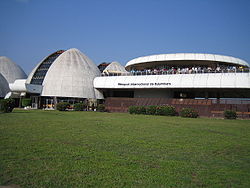Location
The airport is in the extreme northwest of Bujumbura Mairie Province. It is bounded by Bujumbura Rural Province to the north and west, by the RN4 coastal highway running along the shore of Lake Tanganyika to the south, and by the Mutimbuzi River and the RN5 highway to the east. The Mpanda River, a tributary of the Ruzizi River, flows past the north end of the airport.
In October 2018 the Burundi Civil Aviation Authority began dredging the Mutimbuzi River to prevent it from flooding into the airport. Drains would also be installed to prevent flooding. Removal of alluvium and other waste from the river would begin downstream and continue up to the NR5 highway from Bujumbura to Rugombo. In May 2021 the Mpanda River threatened to break the dam that protects the infrastructure of the Melchior Ndadaye International Airport.
Since August 2024, the airport has been undergoing a major renovation, expansion, and modernization project, carried out in two phases as part of Sino-Burundian cooperation. The first phase includes the runway extension, the rehabilitation of the aircraft movement and parking areas, and the construction of a new control tower along with the acquisition of its technical equipment [7] . The second phase of the project will focus on further modernization work, including the construction of a new passenger terminal, among other complementary infrastructure.
This page is based on this
Wikipedia article Text is available under the
CC BY-SA 4.0 license; additional terms may apply.
Images, videos and audio are available under their respective licenses.


